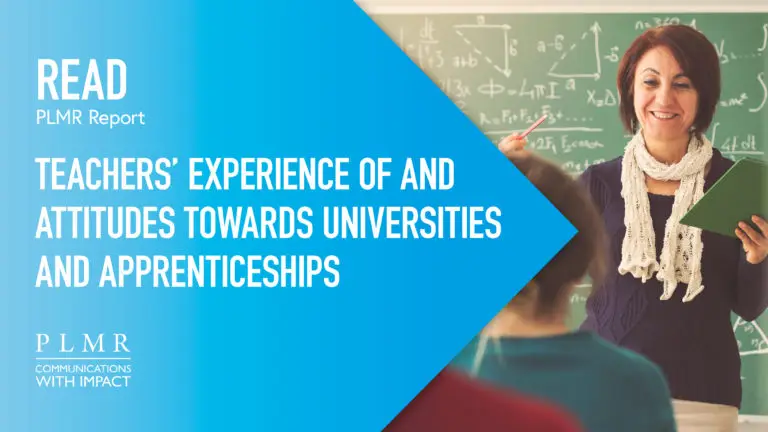The COVID-19 pandemic has radically reshaped our lives in ways we are still struggling to comprehend. Its impact on young people’s education and employment will reverberate for many years.
It has never been more essential for our education system to support young people to find the best path to fulfil their potential. Historically, that path was assumed to be university – and while higher education is as important as ever, there is growing awareness that it may not be the best path for every student.
The challenge facing Government and the wider education sector is: how do we best support young people to understand the wide range of opportunities available to them?
This is why PLMR polled more than 5,000 teachers to analyse Teachers’ experiences of and attitudes towards universities and apprenticeships. Conducted using the teacher survey app, Teacher Tapp, our findings shed light on gaps in the understanding of how to pursue apprenticeship pathways, and recommends ways to make it easier for Government and the wider education sector to support students to find their most suitable path.
Laura McInerney, Co-Founder and CEO of Teacher Tapp says, ‘people often think teachers look down on apprenticeships. But that’s not the case. By asking teachers directly on Teacher Tapp about their real experiences of advising young people, this vital research shows that teachers are supportive of apprenticeships but often lack experience and knowledge of them. When teachers are three times more confident about supporting university applications than other routes, there is a lot of work to be done. But the good news is they want to be part of it. Teachers want to be as confident about supporting all their young people into all routes.’
The story in the data points to an obvious problem. Nearly 70 per cent of teachers agreed that apprenticeships provide excellent future opportunities for students, yet only 26 per cent of teachers feel confident advising students about how to find an apprenticeship. In contrast, when it comes to university applications, an overwhelming majority of 90 per cent feel confident giving advice.
Our recommendations to make it as easy as possible for teachers and students to gain confidence in how to explore and pursue apprenticeships:
- Make it a requirement that all apprenticeships are listed on ucas.com, with employers given the option to opt out – this would mean a comprehensive, one-stop shop for information and applications for universities, colleges, and apprenticeships is available, helping increase the confidence and awareness of apprenticeships among teachers and students.
- Increase awareness of different post-18 opportunities for students through careers advisers – this will positively promote the successful careers available after graduating from university and better signpost and support young people who prefer apprenticeships.
- Create and make accessible easily-digestible resources to boost confidence in understanding apprenticeships.
In a recent speech to Policy Exchange, then-Minister for Skills Alex Burghart MP said he ‘wouldn’t be surprised’ to see increased numbers of students deciding to pursue apprenticeships rather than university over the next decade. While the former Minister said he remained a strong believer in the importance of a university education, it was his time as a lecturer that brought home the truth that not every student was well suited to higher education.
Yet, as Philip Le Feuvre, Chief Strategy Officer at NCFE, an educational charity and leader in vocational and technical learning, says, ‘the findings of this report demonstrate the real need for more awareness of Degree Apprenticeships, and vocational education more broadly.
NCFE supports our recommendations to rapidly boost careers advice for apprenticeships and would welcome the introduction of accessible easily digestible resources to boost confidence in understanding apprenticeships and to offer teachers all the tools needed to equip learners with the knowledge required to make an informed decision.
It is often said that the future world of work is comprised of many jobs that have not even been invented yet. Students today can find work in sectors that didn’t exist for their parents, while other opportunities are closed to them as new technologies and automation makes jobs of the past obsolete. But it is crucial that our education system keeps pace with this change and empowers learners to tread new and different paths. As Mary Curnock Cook CBE says in her foreword to our report, ‘all could benefit from clarity and much greater information about the full range of post-18 pathways’.
Barnaby Lenon, Chairman of the Independent Schools Council, also supports the research, adding, ‘pupils need to understand the options available to them and the different routes all need to represent high-quality and credible choices. Teachers need greater support to be able to confidently and effectively promote apprenticeships to their pupils. And there is clearly need for a simple system like UCAS to ease the process, as this report highlights’.
Our recommendations include easy wins and long-term solutions for Government. Much of the heavy policy lifting around formalising apprenticeship pathways has already been done – the gap lies in knowledge and understanding of those pathways. Further, our recommendation to require all apprenticeships to be listed on UCAS would be a game-changer according to John Cope, Executive Director at UCAS – allowing “…people to compare side-by-side for the first time higher education, technical education, and apprenticeships to make the right choice for them”.
This sentiment is echoed by Leora Cruddas, Chief Executive Officer of Confederation of School Trusts, the sector body for school trusts in England accounting for 2.5 million children and young people. Leora says, “this is a timely and important report. As the drive for more young people to take up apprenticeships accelerates, it’s critical schools and Trusts have the knowledge and confidence to give meaningful advice. The recommendations in the report would go a long way in realising that ambition – particularly centralising and simplifying the process, with proper professional development for school staff, which is surely an open goal for Government.”
If Government seizes on this opportunity, it will support their Levelling Up agenda, further strengthen the education system and ensure all young people, regardless of their background, can pursue the opportunities that are right for them.
Download the full report here.





